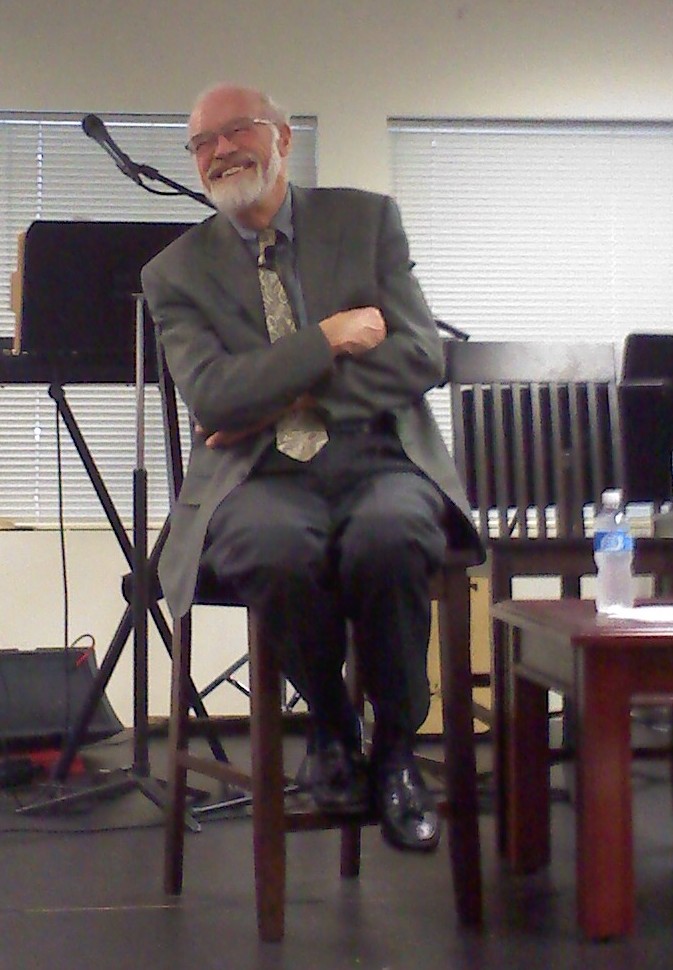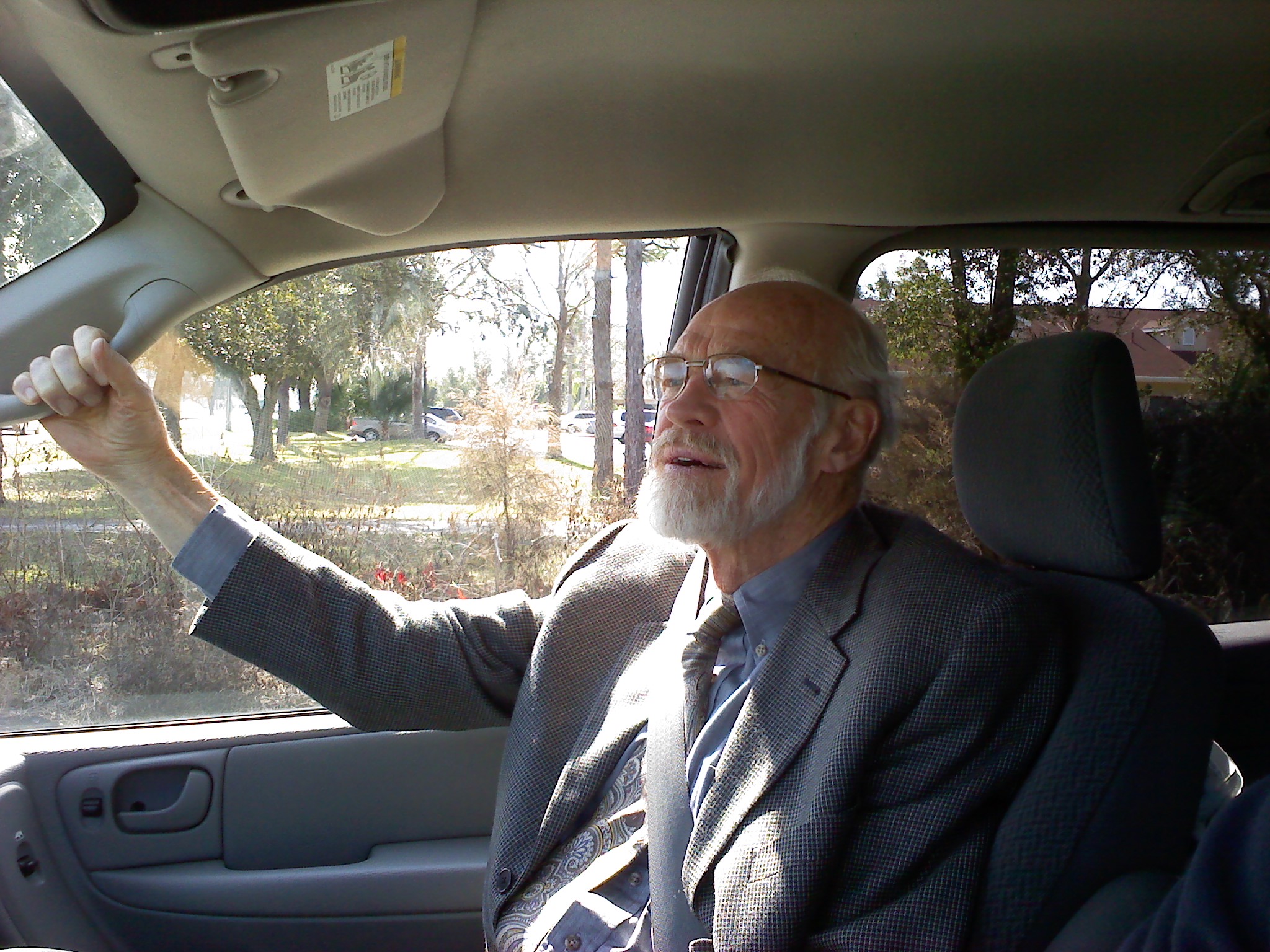A Few Days with Eugene Peterson
 Appreciate your pastoral leaders who gave you the Word of God. Take a good look at the way they live, and let their faithfulness instruct you, as well as their truthfulness. There should be a consistency that runs through us all. For Jesus doesn’t change—yesterday, today, tomorrow, he’s always totally himself. — Hebrews 13:7-8 from The Message
Appreciate your pastoral leaders who gave you the Word of God. Take a good look at the way they live, and let their faithfulness instruct you, as well as their truthfulness. There should be a consistency that runs through us all. For Jesus doesn’t change—yesterday, today, tomorrow, he’s always totally himself. — Hebrews 13:7-8 from The Message
I consider myself lucky to have spent three days listening to Eugene Peterson (EP) for two and half days last week at Asbury Seminary’s Orlando Campus. He was the primary “speaker” at Asbury’s Kingdom Encounter Conference, and gathering of seminary students, faculty, and pastor. It was an intimate (and tightly compacted) setting with 150 of us conversing with Peterson as he shared his heart through his five most recently publications:
Christ Plays in Ten Thousand Places
Eat this Book
The Jesus Way
Tell It Slant
Practice Resurrection (which was just released)
These books were written to be conversations in spiritual theology and the conference followed this conversational lead. Peterson sat on a chair on the makeshift platform and told stories and shared concepts from each of these books. After his presentation, a seminary faculty member would ask questions and then question would come from the audience.
Here are some of my take-aways:
Day One
“I think the pastoral ministry in America is being ruined.”
This was one of EP’s opening remarks. This statement goes to the heart of his “shopkeeper” criticism in Working the Angles. Pastoral ministry is too concerned with success and measuring success and other, very American, concerns. Pastoral ministry is about loving people in Christ-like humility. It is about remaining local and personable and approachable. It is more about loving people through the seasons of spiritual growth, than merely being concerning with counting those who have been born into the kingdom. “Birth,” according to EP, “seems to get more attention than growth.” This misplaced attention is ruining our ministry.
Enter his new book Practice Resurrection, an interaction with the Book of Ephesians regarding spiritual formation. The title is from “Manifesto: The Mad Farmer Liberation Front” a poem by Wendell Berry. EP has formally introduced me to Wendell Berry’s work. I think Berry has something to say to the modern (postmodern) Evangelical Church in the United States. Berry sounds like a prophet.
Practice Resurrection is EP’s attempt to find the form for the beauty of holiness. We pay attention to the good (ethics) and the true (doctrine), but lose sight of the beautiful (formation). Holiness – or transformation into the image of Christ – is a kind of beauty, equally important as ethics and theology. It is rooted in the resurrection of Christ. In the resurrection we see the awe, the mystery, the beauty of God’s work by the Spirit in Christ. It is an altogether mysterious and beautiful event that leads to beautiful transformations.
Beauty, of course, is the language of artists. EP encourages us to learn from theologians and artists, because “artists help us see something we know for the first time.” Very true.
There was much talk on day one about the contemplative life, that is a life devoted to the disciplines of prayer, Scripture reading, silence, solitude, fasting, etc. I struggle with these disciplines and so I was happy to hear someone from the audience ask how we can live a contemplative life if it doesn’t fit our personality types. EP said that the contemplative life is not merely passive; it is simply paying attention to God. Sabbath is what pastors need. We need a habit of Sabbath-keeping so that we can pay attention to God.
“The contemplative life has nothing to do with being quiet; it has to do with paying attention.”
This phrase rolled around in my heart through the rest of the three days: “pay attention.”
Just pay attention.
EP referenced to enemies of God’s work: Gnosticism & moralism.
Gnosticism (the belief that only that which is spiritual is of real value) corrupts God’s good creation.
Moralism (the belief that salvation is accomplished by keeping the rules) is the biggest heresy regarding salvation.
So how do we live the Christian life? He says that he has trouble with the word “discipline,” as in the phrase “spiritual disciplines,” because “discipline” refers to something we do. He prefers the phrase “the fear of the Lord.”
I was thrilled to hear EP say “The Trinity is a great teaching point for pastors.” The rediscovery of God as a holy community of persons, Father, Son, and Spirit, has been one of the most rewarding, challenging, inspiring, transformative roads in my spiritual journey. The exploration of the Trinity reveals that God is personal and that he reveals himself in personal relationship. God is active. He is involved as he exists in the perichoresis – the “dance” shared between the members of the Trinity.
Day Two
“Language is not just about information.”
EP had a lot to say about the nature of language, which led into a deeper conversation about the nature of language in the Scripture. He challenged us to not just try to “whip meaning” out of the Scripture, but to approach it with humility and faith and careful observation. He reminded us: “Don’t ask too many questions when you come to the text. Just listen. Pay attention.”
Again his conversation with us was reverberating with the idea of paying attention. The original audience of the gospels and the letters of Paul and the other Apostles was a community steeped in an oral culture. The original writings were not read privately by individuals; they were read aloud in community. Most of those early Christians did not read the Scripture as much as they listened to. I determined to develop a habit of listening to the text being read. On my way home from the conference, I stopped into a used book store and found a 16 CD collection of the New Testament being read by the one and only, Mr. Johnny Cash. Sweet.
In addition to reading the text for information, I realize I need to also listen to the text in order to allow my imagination to be renewed. This is a paradigm shift.
EP said that he didn’t like the word “leadership,” because it sounded too cooperate, too business-like, too un-Jesus-like. His book The Jesus Way began as a book for Christian leaders. He wanted to compare the way of Jesus to the way of other leaders in the day of Jesus and the Apostles. He compares the way of Jesus to the way of Herod (the violent leader), the way of Caiphus (the legalistic, rule-driven leader), and the way of Joesphus (the opportunistic, unscrupulous leader).
The Jesus way was not akin to any of these ways. It was (and is) unique and subversive.
Day Three
“The Jesus way is the way to be human.”
The way of Jesus is easy and it is hard. It is easy because it is human, it is not other-worldly. It is personal, conversational and it is ordinary. The way of Jesus is hard because it is outside of our control and manipulation. It requires are participation and work. And there is no inside track, no short cut.
So much more was said and so many more thoughts passed through my brain, but this is sufficient for now. This blog has gone on long enough.
Eugene Peterson is a wealth of possibilities and challenges. He is an aged sage for our times. He is humble and gracious. I feel like I am only scratching the surface.
P.S. Here is EP riding in my mini-van. I snapped this picture on my cell phone when we had stopped at a red light. I don’t think he knew I took the picture. I had asked him about his upbringing in Pentecostalism. Very cool.
